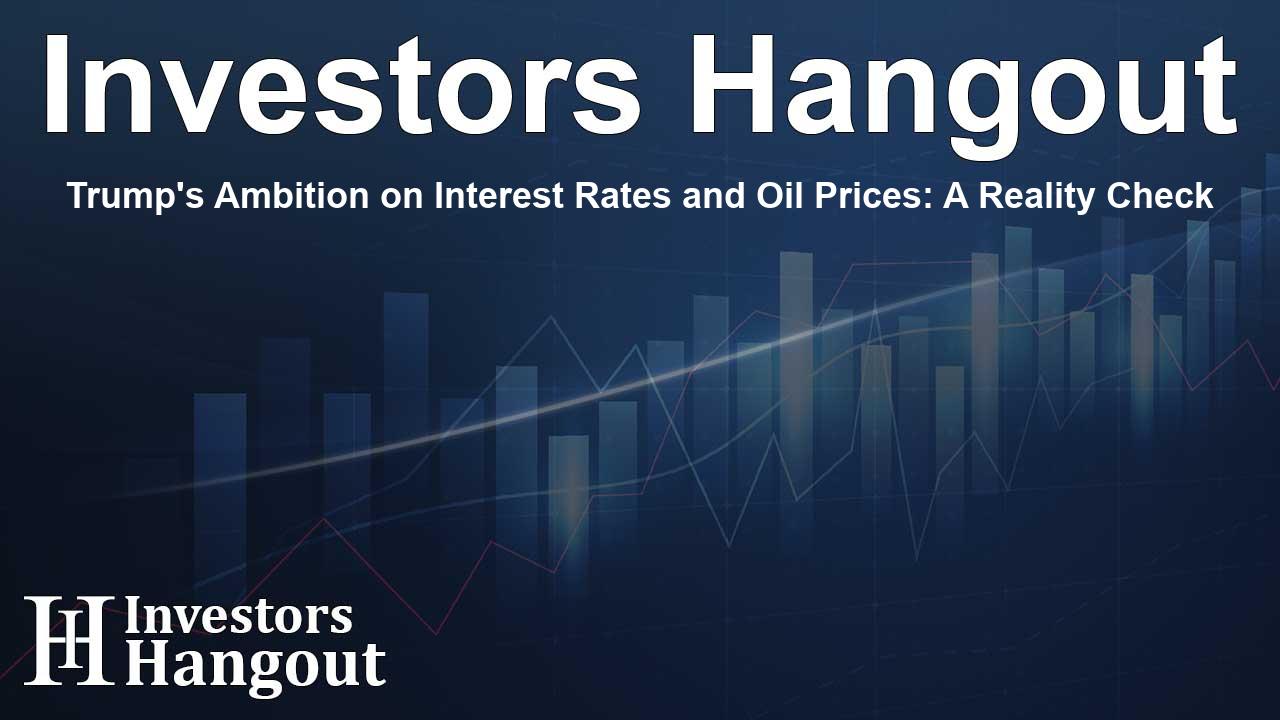Trump's Ambition on Interest Rates and Oil Prices: A Reality Check

Trump's Ambitious Plans for Interest Rates and Oil Prices
In a bold move during his presidency, Trump aimed to reshape key economic policies, particularly focusing on interest rates and oil prices. His push came amidst a series of executive orders that highlighted his willingness to take dramatic actions in pursuit of his economic goals. One of the most striking declarations was his intention to urge the Federal Reserve to lower interest rates.
The Call for Lower Interest Rates
During a virtual address, Trump proclaimed, “I’ll demand that interest rates drop immediately.” This statement sought to align with his broader strategy to stimulate the economy by advocating for reduced costs associated with borrowing. His connection between interest rate reduction and oil costs underscored an interdependent view of these economic factors.
Trump’s Strategy on Oil Prices
Alongside his focus on interest rates, Trump also aimed to engage with oil-producing nations, particularly Saudi Arabia, urging them to control oil prices. “I’m going to ask Saudi Arabia and OPEC to bring down the cost of oil,” he stated, recognizing the vital link between oil economics and broader financial conditions.
Understanding the Challenges
However, the prospect of a president effectively commanding interest rates and oil prices is surrounded by considerable skepticism. Both factors are governed by multiple global influences, including market dynamics, demand and supply fluctuations, and various economic indicators. The reality is that despite the president's platform, the expectation that he can manipulate these key elements may prove unrealistic.
The Role of the Federal Reserve
The Federal Reserve maintains control over short-term interest rates, operating with a mandate that not easily bends to presidential will. While it is conceivable for Trump to issue an order, the practical reality involves navigating a complex legal and operational landscape. Fed Chairman Jerome Powell has made it clear that the president lacks the legal authority to unilaterally make such changes.
Exploring the Congressional Landscape
While the Republican Party holds sway in Congress, making changes to the Federal Reserve’s operations is still a formidable task. Hypothetical scenarios where the president gains the ability to set rates would fundamentally alter the structure of U.S. monetary policy. This could transform the Fed into a mere extension of the executive branch, a departure from its established independence, which is designed to safeguard against political interference.
The Long-term View on Interest Rates
Even if a drastic legal shift were achieved, the ramifications could be profound. Rates beyond the short term wouldn’t necessarily follow the lead of the Federal Reserve, as evidenced by the behavior of long-term Treasury yields, which often diverge from short-term trends. Recent movements in bond yields suggest a broader market determination that resists simple manipulation.
The Oil Price Challenge
Turning to oil, it is apparent that while Saudi Arabia has a significant role in regulating oil prices globally, this influence is capped by market realities. The country's vast reserves position it uniquely, yet any collaboration between Saudi leadership and Trump would require careful negotiation, potentially entailing concessions that are not readily available.
The Historical Context of Influence
Historically, U.S. presidents have attempted to exert pressure on both the Fed and oil producers with varying degrees of success. For example, President Nixon’s efforts to sway monetary policy for electoral gain reflected the complex interplay between politics and economics. Similar attempts today run the risk of facing the same unfavorable outcomes.
The Final Word on Market Forces
Ultimately, interest rates and oil prices will respond predominantly to market forces outside of governmental control. The fundamental principle behind market economics states that those who seek to bypass or alter market behavior eventually face backlash. Players in the market, including consumers and investors, drive price discovery in ways that policymakers cannot easily disrupt.
Frequently Asked Questions
Why did Trump aim to lower interest rates?
Trump believed lowering interest rates would stimulate economic growth and make borrowing cheaper for businesses and consumers.
How does the Federal Reserve fit into Trump's plans?
The Federal Reserve controls short-term interest rates, and Trump’s push would have required significant alteration to their independent operation.
Can the president influence oil prices directly?
While the president can ask oil-producing countries to adjust prices, actual influence depends on complex global market conditions.
What historical instances show presidents influencing economic policy?
Past presidents, like Nixon, have pressured the Fed and oil producers, but such efforts have often had mixed results and raised concerns about credibility.
Why are market forces important in this context?
Market forces govern price determination, and any attempts to control them through political means often fail, highlighting the limits of governmental influence.
About The Author
Contact Logan Wright privately here. Or send an email with ATTN: Logan Wright as the subject to contact@investorshangout.com.
About Investors Hangout
Investors Hangout is a leading online stock forum for financial discussion and learning, offering a wide range of free tools and resources. It draws in traders of all levels, who exchange market knowledge, investigate trading tactics, and keep an eye on industry developments in real time. Featuring financial articles, stock message boards, quotes, charts, company profiles, and live news updates. Through cooperative learning and a wealth of informational resources, it helps users from novices creating their first portfolios to experts honing their techniques. Join Investors Hangout today: https://investorshangout.com/
The content of this article is based on factual, publicly available information and does not represent legal, financial, or investment advice. Investors Hangout does not offer financial advice, and the author is not a licensed financial advisor. Consult a qualified advisor before making any financial or investment decisions based on this article. This article should not be considered advice to purchase, sell, or hold any securities or other investments. If any of the material provided here is inaccurate, please contact us for corrections.
